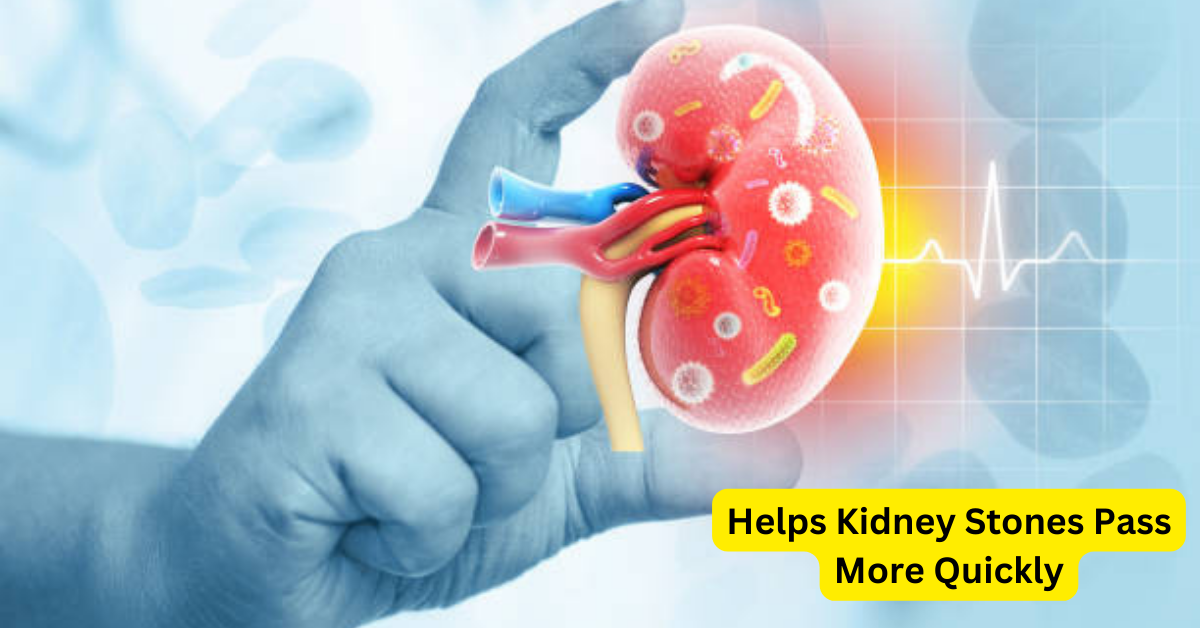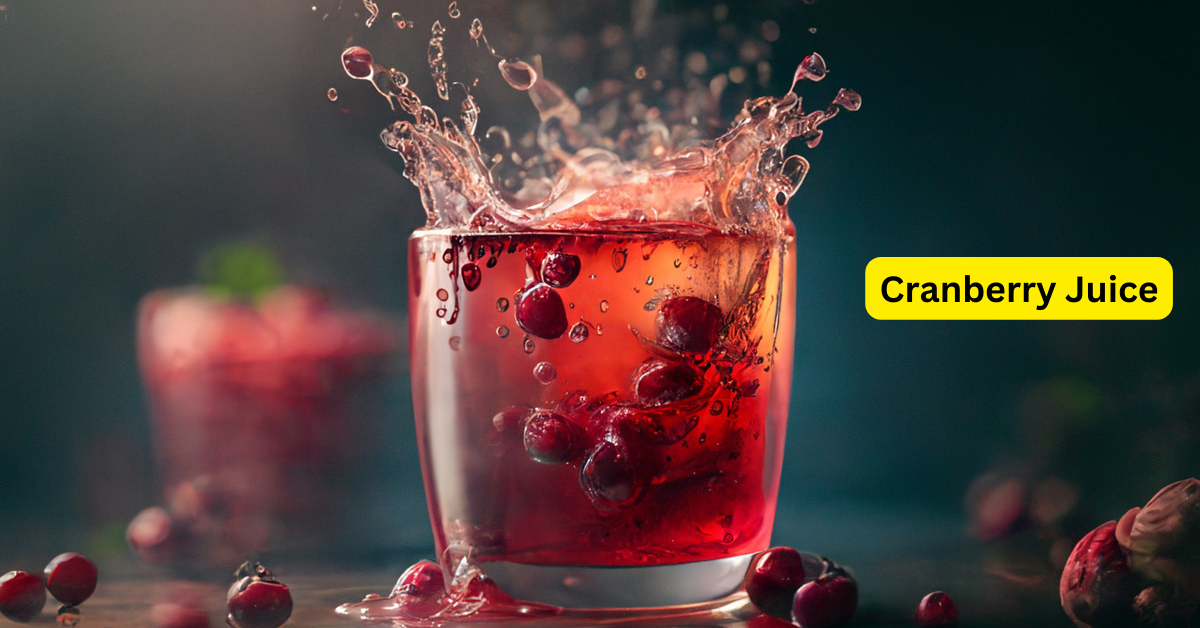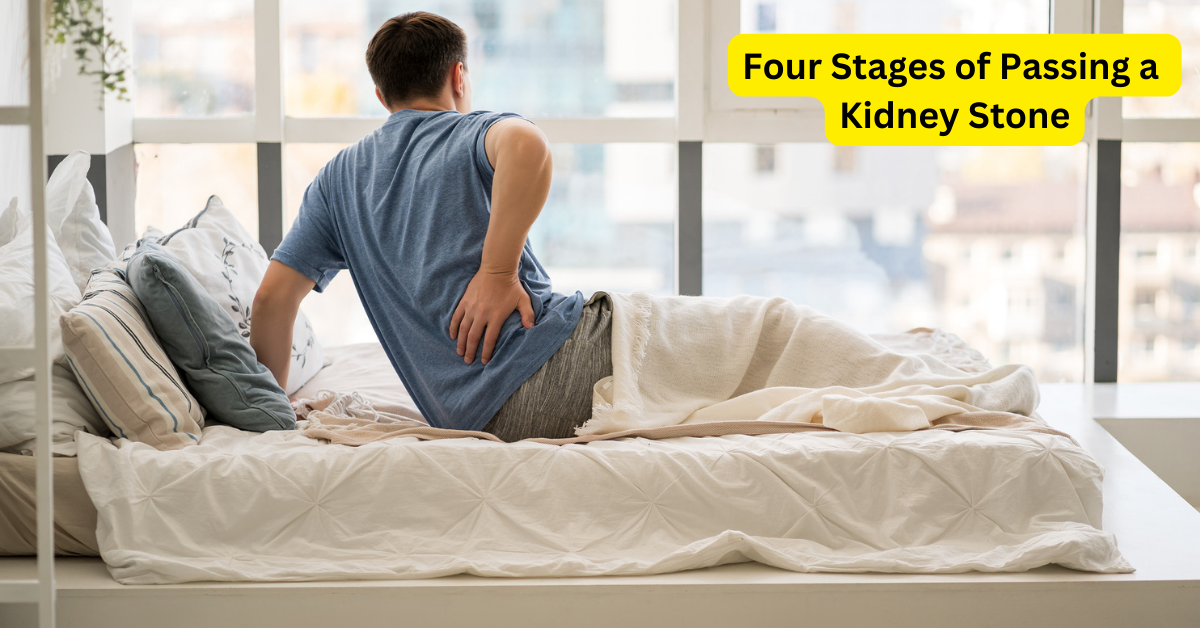Four Stages of Passing a Kidney Stone. A kidney stone passes through four stages: it forms, leaves the kidney, travels to the bladder, causes pressure, and finally exits the body.
A kidney stone may pass independently, although it is excruciating.
This article will discuss the stages of passing a kidney stone, what symptoms to look for at each stage, and when to seek medical attention.
What are Kidney Stones?
Your kidneys remove fluids and waste from your body. If you have too much salt, minerals, or chemicals in your body but not enough urine, the excess material can crystallize in your kidneys.
Other particles may attach to the crystals, forming a hard object (a “stone”) that your body may attempt to pass through.
Kidney stones are classified according to the primary material they are made of.1 The most common types are calcium oxalate, uric acid, and cystine stones. Struvite stones, composed of magnesium ammonium phosphate, are frequently associated with a urinary tract infection and can grow large quickly.
Related: What is Lewy Body Dementia?
How Common are Kidney Stones?
Approximately one in every ten people in the United States will eventually develop a kidney stone.2 They are more prevalent in men than in women. They also appear to be more prevalent in white people than in people of other races.
Stages of Passing A Kidney Stone
Kidney stones develop and pass spontaneously in four stages.
1) Kidney Stone Formation.
Kidney stones can form if urine becomes concentrated because the body has insufficient water. This allows crystals to grow and attract other materials.
The formation of a kidney stone is painless.
2) The stone leaves the kidney.
The second stage of passing a kidney stone occurs when the stone enters the ureter, which connects your kidneys to your bladder.
Pain can come in waves as the ureter contracts to try to pass the stone. The stone can get stuck at the junction of the ureter and renal pelvis (ureteropelvic junction), in the ureter itself, or near the intersection of the ureter and the bladder (ureterovesical junction)
3) Bladder pressure builds.
When the stone enters the bladder, pressure builds up within the organ. At this point in the process of passing a kidney stone, you will have an urgent need to urinate frequently. Most acute pain is relieved or eliminated as the stone exits the ureter.
4) Kidney stones exit the body.
When you urinate, the kidney stone is forced out of the bladder and exits your body through the urethra. Typically, there is little to no pain during the final stage.
How Long Did It Take to Remove a Kidney Stone?
The time it takes to pass a kidney stone is determined by its size. A stone under 4 millimeters (mm) can pass in a week or two, while larger stones can take up to four or six weeks.
How much does it hurt to pass a kidney stone?
Most people associate the pain of passing a kidney stone with stage 4, which is when it exits the body. However, pain is most commonly associated with stage 2 (when it exits the kidney).
If the stone is small enough, it can pass through each stage without your knowledge. In some cases, passing a kidney stone can be extremely painful. Some consider it to be worse than giving birth.
Larger kidney stones may cause the following symptoms: Severe back, side, or abdominal pain (often on one side) that may come on suddenly.
- Pain that occurs in waves several times per hour.
- Urgent need to urinate.
- Urinary Pain
- Blood in the urine
- Nausea or vomiting.
- Fever and chills. (This may be caused by a urinary tract infection,
which is dangerous if it co-occurs with passing a kidney stone and warrants immediate medical attention.)
When kidney stones move through your body, they can cause excruciating pain, almost like someone is jabbing you with a knife.
How Do Kidney Stones Look When They Pass?
Kidney stones are pebble-like items that vary in size, from a single grain of sand to a ping-pong ball. They might be smooth and smooth or irregular with sharp edges and are typically yellow or brown.
When to Call a Healthcare Provider:
If you have severe pain, fever, or vomiting while passing an intestinal stone, seek medical attention right once.
Kidney stones can cause infections that require treatment. If you are still unsure what to do, please get in touch with your provider.
What Helps Kidney Stones Pass More Quickly?
If you have a kidney stone, you can pass it yourself. There are various things you may do to speed up the process.
- Stay hydrated. Drinking enough of water or other hydrating fluids is essential for flushing out a kidney stone.
- Avoid irritating beverages. Reduce the amount of coffee, tea, alcohol, and soda you consume while attempting to pass a kidney stone. Concentrate on drinking water.

- If you dislike plain water, try adding some lemon. It contains citrate, a natural substance that may help dissolve a stone.
- Think about your diet. A high-sodium diet can increase the risk of kidney stones, so avoid snacking on salty foods and adding salt to your meals. 9You also don’t want to overeat protein since it can raise your risk. While calcium and oxalates can cause kidney stones, you should not avoid these minerals in your diet. You should be aware of how much you ingest.
- Start moving. Although you might not want to move if you’re in much pain, walking around can help the stone pass faster.
To reduce discomfort while waiting for the stone to pass totally:
- Apply heat. A heating pad can assist relieve the agony of passing a stone from your kidneys, and soaking in an inviting bathtub may also help.
- Take OTC painkillers. An over-the-counter painkiller like Motrin (ibuprofen) may alleviate discomfort and inflammation. However, if you have severe kidney stone pain, over-the-counter pain medications may not be sufficient.
- You may experience some discomfort after passing the stone. If these at-home remedies do not work, contact your provider.
If you cannot pass a kidney stone yourself
If you end up calling your provider or going to the ER because you have a kidney stone that’s not passing, there are a few things they may try.
Sometimes, your provider might prescribe you a medication called Flomax (tamsulosin) to help pass a large kidney stone.11 However, research needs to indicate whether the medication is always effective for this purpose.
You may need to undergo a surgical procedure known as shock wave lithotripsy, which uses sound waves to break up the stone into smaller pieces that are easier to pass. Surgeons can also use a special camera called a ureteroscope (a narrow tube with a camera at the end) to reach the stone in the ureter or kidney and break it up with a laser. You will be sedated throughout the procedure, so you will not experience any pain or discomfort.
Surgeons can also use an endoscope (a narrow tube with a camera at the end) to access and break up the stone. You will be sedated throughout the procedure, so you will not experience any pain or discomfort.
After the stone has been removed, it will be submitted to a lab for analysis. This can help you decide whether or not you can reduce your chances of developing additional kidney stones.
Can You Prevent Kidney Stones?
You cannot always avoid kidney stones. For example, if you already have kidney disease, you might be unable to prevent them.
You might also need to be on certain medications that can lead to kidney stone formation, including diuretics (which increase calcium excretion in the urine) and antacids (which can contain stone-forming minerals).
However, whether these apply to you or not, it is always worth taking steps to try to prevent kidney stones from occurring, such as:
-
Stay hydrated. If you have a history of kidney stones, you must stay hydrated.
-
Watch your diet. Be mindful of the foods you consume frequently, and try to limit those high in protein, salt, and processed sugar. Citrus fruits can help prevent kidney stones.
Does Cranberry Juice Help Prevent Kidney Stones?

According to research, the type of kidney stones determines whether cranberry juice and cranberry extract supplements can help prevent kidney stones.14 For example, cranberry juice, which is high in oxalates, may increase your chances of developing kidney stones.15 However, other studies have found the opposite.
Summary
A kidney stone passes through four stages: formation, movement into the ureter, bladder, and exiting the body in urine.
Kidney stones can be excruciating, but you should feel significantly better once the stone has passed. While you may be able to pass a kidney stone on your own at home, if you are in severe pain and have a fever, seek medical attention.
If you are unable to pass a kidney stone on your own, you may need to have it broken up or removed surgically.
